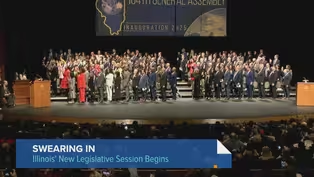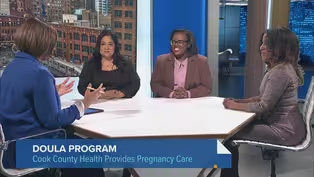Chicago Tonight: Black Voices
Bill Makes It Easier for Kids in Foster Care to Live With Relatives
Clip: 1/8/2025 | 8m 34sVideo has Closed Captions
The KIND Act unanimously cleared the Illinois Senate and House.
Nearly 10,000 children in DCFS care live with family members, but more than 60% of those families are not eligible for foster care support services. A new bill aims to address that.
Problems playing video? | Closed Captioning Feedback
Problems playing video? | Closed Captioning Feedback
Chicago Tonight: Black Voices is a local public television program presented by WTTW
Chicago Tonight: Black Voices
Bill Makes It Easier for Kids in Foster Care to Live With Relatives
Clip: 1/8/2025 | 8m 34sVideo has Closed Captions
Nearly 10,000 children in DCFS care live with family members, but more than 60% of those families are not eligible for foster care support services. A new bill aims to address that.
Problems playing video? | Closed Captioning Feedback
How to Watch Chicago Tonight: Black Voices
Chicago Tonight: Black Voices is available to stream on pbs.org and the free PBS App, available on iPhone, Apple TV, Android TV, Android smartphones, Amazon Fire TV, Amazon Fire Tablet, Roku, Samsung Smart TV, and Vizio.
Providing Support for PBS.org
Learn Moreabout PBS online sponsorship>> Nearly 10,000 children in the care of Illinois Department of Children and Family Services live with relatives.
But more than 60% of those families are not eligible for foster care, support resources.
new bill aims to address that issue and more the kinship in demand or kind act unanimously cleared the Illinois Senate and House this month.
Governor JB Pritzker voiced support for the legislation and is expected to sign it into law.
Here with more on the bill are nor Collins, Mandeville director of systems, reform policy at the ACLU of Illinois.
a deer vice president of chill child welfare children, welfare.
At bright point and we hope to be joined shortly shortly via zoom by state Senator Mike Simons, a Democrat whose district represents parts of Chicago's North side Noren.
Emily, thanks to the both of you for joining us.
Nor let's start with you.
Please tell us about this legislation and what it would do.
This legislation is really exciting.
This is an ACLU initiative.
>> That is focused in 3 main components.
One is making sure that relatives are informed when again, person comes into care and engaged throughout that whole process.
The second portion addresses, relatives who become caregivers for young people or wish to become caregivers for for their relatives on this is making sure that their support there's a navigator that can be provided for them and that the funds that are paid to the that relative are equal to what a foster parent with you paid.
And then lastly, this removes barriers to permanent guardianship.
This is a really important permanency glow when young people can't be returned to their home, why had relatives who are interested in caring for a relative child who is in foster care?
Why have they not previously been receiving?
>> Some of that support.
>> up last it's now it's 2 Octobers There was a federal rule on that was put in place that actually removes a barrier to receiving federal funds to subsidize those payments that are made relatives.
And so with that new rule, we now are going to be eligible.
And with this new statutory change will be eligible to draw down federal funds to help us to pay on that equivalent amount, which is what we do for foster parents.
We include state funds and federal funds and this will allow us to do that for relatives structure, nor was it important for children to be placed with relatives.
Not sorry, 9 family.
Was it important for children to be placed with relatives when when possible?
Yeah, absolutely.
We know.
And research shows us that children do best when they're placed with family.
>> It's already a traumatic event when children have to be removed from their families.
But if we can place him with someone they know with someone they trust usually in their home community them that lessens the trauma of the child having to be separated for their family.
So that's a great component.
>> It also children who are placed with can are also more likely to be stable in their placement, which produces better outcomes at school with their social and emotional adjustment and produces better outcomes overall for the child and their family.
What are some of the challenges that relatives might experience when attempting to become the foster parent for those kids are currently licensing regulations Pre Kind Act passing are really not built for kinship parents.
They are very stringent.
They're very bureaucratic.
Unfortunately, they're built for people who have spent a lot of time thinking about whether or not they want to become foster parents and the situation for a lot of our can foster parents is that they may get a call in the middle of the night saying can you step in?
Can you care for your loved one?
And so what this will do is it significantly reduce the burdens to helping kinship caregivers, get equitable access to resources, services and board payments.
So it reduces things like having a specific number of bedrooms that children have to have in the home or having a specific number of square feet per bed per child per bedroom.
So some really bureaucratic walls that we're now able to lessen and make sure that we create the easiest possible pathway to get equitable access to resources for those kinship caregivers, DCFS data currently shows there are more than 18,000 total children in the system and more than 8,000 of them are researchers at the University of Illinois found that black children are 250% to 5, 0%, more likely to be DCFS involved.
>> Norwood, what what's the cause for this disparity?
The disparity.
Well, at their peril, it's a very comfortable Yes, up.
>> Really, when you think about the different ways young people can become can be brought to attention of the system and the ways that the bias that can happen when we're making decisions about what we see is happening in a family.
There can be that there can be bias that comes into those decisions about when that when a young person is safe or not safe in their home and what type of services can to mention.
They're also going to sort of some some demographics and socioeconomic factors that go into that as well.
Yes, that's absolutely true.
The legislation, it also includes more oversight.
Nortel, we hope that will work for.
So this actually will require the court to monitor whether that relatives are being engaged throughout the process.
So the court will will hold the department accountable and that way, this is really important for making sure that young people have a permanent home if they can't home to their parents.
>> Emily, the norm mentions the kinship navigator earlier.
Tell us about that how this legislation applies that Kinship that navigator programs are great systems and I'm so excited.
We're gonna happen in Illinois.
Other states have implemented the most that well.
>> But they're really comprehensive support systems for kinship caregiver.
So that can be kinship, caregivers that are involved in the foster care system.
It can be can that are caring for their children or their family members that are never involved.
Child welfare, but it can provide things like support groups, access to local community resource legal support kinship caregivers need.
That's what really is a comprehensive system of supports to people who are caring for their can.
there was also the mention, I into this as earlier as well.
A permanent guardianship.
Yeah.
How does this legislation were trucks that absolutely so permanent guardian, permanent guardianship or kinship guardianship is a pathway that is really a much more family centered permanency pathway than what we have currently in our system.
It allows family members who want to provide a permanent loving home to the child that's in their care, a pathway to do so without having to terminate parental Currently a permit pathway and our system is adoption.
But order to get to adoption, you have to terminate the park parental rights of that parent.
So you may be looking at a situation where you have a grandmother who's taken and their grandchild, but in order to get to adoption, they have to ask their son or daughter to terminate their parental rights.
Are court to get to that pathway so it can ship guardianships allows us a permanent path way to provide that young person, a loving and permanent home without having to do that.
Tpr about the terminating parental rights route.
So it provides a great option for the family and it really is so much more family centered approach imagine like that termination parental rights might also be a barrier of parents like is fine with you raising the child because I'm in no condition to do it.
But I don't want to give him my parental rights.
jointly absolutely.
And it often takes a lot more time to 3rd quart.
So this could be a quicker permits.
The option as well, nor what kind of accountability measures are going to be in place for this This is really need.
So what we've done is we have a public reporting requirement so that we can actually monitor and look at what what what the statistics are telling us.
>> And then 3 years after implementation happens top the bill becomes effect when it when it has been in effect for 3 years.
up that the auditor general Illinois Auditor General will actually comment evaluate whether the department has performed, whether the department has followed what all of the provisions of this very large piece of legislation whether the department has met those obligations.
What more would you like to see done to support children who are in foster care?
And of course, you know, the adults who care for them.
>> I the biggest thing that we could do to change the system is really make it driven by a young person's voice and by their families and not just say we want to hear what a young person wants to have happen, but to actually have that young person's voice listen to and have that drive on the way that a case is going.
So I think anything we can do policy buys to ensure that that happens in a meaningful way is really important as well as ensuring that young people have a seat at the policymaking table.
So not just for their own case, but thinking about the whole system redesign advocating for themselves as well as others who are also in a foster care who have that experience.
That is where we'll have to leave.
Illinois' New Legislative Session Begins
Video has Closed Captions
Clip: 1/8/2025 | 3m 56s | The 104th General Assembly was inaugurated. (3m 56s)
New Program Connects Pregnant Patients With Free Doula Services
Video has Closed Captions
Clip: 1/8/2025 | 8m 26s | Black maternal morbidity is up in Illinois. Cook County is working to change that. (8m 26s)
Providing Support for PBS.org
Learn Moreabout PBS online sponsorship
- News and Public Affairs

Top journalists deliver compelling original analysis of the hour's headlines.

- News and Public Affairs

FRONTLINE is investigative journalism that questions, explains and changes our world.












Support for PBS provided by:
Chicago Tonight: Black Voices is a local public television program presented by WTTW

